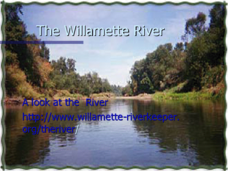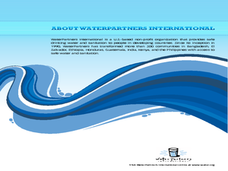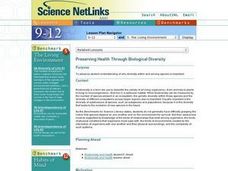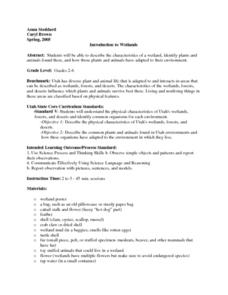Curated OER
Society - Timeline
Students look at a timeline of the development of different disabilities and discuss how different they all are. In this disabilities lesson plan, students then fill out a worksheet of examples of different kinds of disabilities.
Curated OER
Timeline
Students discover how people with disabilities have played a significant role in society throughout history. In this language arts and social studies lesson, students design a timeline that shows the inclusion of people with disabilities...
Curated OER
The Wonderful World of Slugs
Examine a slug? Of course, what else would a 2nd grader do with it? Pupils use clues and go on a slug hunt, read a slug story, or make a cooperative group mural of a slug's habitat. While older learners catalog slugs, go on a slug hunt,...
Curated OER
The Willamette River
An informative set of slides inspects the Willamette River. Hydropower dams, agriculture, and the presence of major cities on its banks have led to increased bacteria, temperature, and mercury content as well as skeletal deformities in...
Curated OER
Walking For Water
Young scholars investigate how third world countries get their water. In this water instructional activity, students research how countries like Kenya and Ethiopia get their water supply. Young scholars participate in an experiment to...
Curated OER
Preserving Health Through Biological Diversity
Young scholars research and explore the benefits of biodiversity, particularly as it relates to human health. They write an essay in which they explain the possible effect of human activities on the emergence of new diseases.
Curated OER
Global Warming: Life in a Greenhouse
Students examine the evidence that scientists have used to support the existence of global warming and the greenhouse effect. How the concepts have been developed and evaluated form the focus of this lesson.
Curated OER
Global Water Crisis
Learners research a given nation and complete an activity chart for that country. In this water crisis lesson plan students work in groups to organize and present the information for their given country.
Curated OER
Insects!
Students explore the diet of insects. In this "insects" biology lesson, students take a nature walk and collect various natural materials they think may be eaten by insects. Students sort and classify these materials into three diet...
Curated OER
Sports in China: What And Why They Play?
Students study several different types of Chinese sports played throughout history in China. They examine the historical perspective of the importance of sports in Chinese culture and create a final project using information about three...
Curated OER
When Building Up Leads to Breaking Down
Students examine where one develops his or her views about health and ways in which teen-agers exhibit these influences, focusing particularly on the rising trend of anabolic steroid use in teen-age girls.
Curated OER
Tornadoes
Middle schoolers examine the characteristics of a tornado. They practice using new vocabulary and participate in a question and answer session. They use the internet to gather more specific information.
Michigan Sea Grant
Fish Identification
Using a dichotomous key, pupils identify characteristics of fish who live in the Great Lakes and explain how these features help them survive. In small groups, class members discover what features scientists consider important and...
Curated OER
Louisiana's Major Folk Regions
Students study the three major folk regions of the state. They break the regions down into smaller folk regions or use the concept of three regions: North Louisiana, South Louisiana, and New Orleans. They identify some of the markers...
Curated OER
Canada's Arctic Barometer
Students research arctic climates. In this Web-quest investigation, students will identify Arctic climate changes, explain the effects of these changes, relate the changes to other regions, and write their findings in a letter format.
Curated OER
Japan
Second graders experience, through a hands-on approach, Japan's geography, daily life, language, foods, education, customs, art and literature. They discover all the exciting events that take place to make it really seem like they are...
Curated OER
Multinational Corporation Relocation
Students examine and analyze the concept of why multinational corporations relocate production facilities from developed nations to less developed nations. They explore the patterns and networks of economic interdependence incorporating...
Curated OER
Kure Waste Chase Game Lesson
Students work together to identify marine debris. They explain the effect of the debris on various ecosystems. They draw different types of ocean currents as well.
Curated OER
Whale Watcher Game Lesson
Students participate in an online whale watching game. They identify the reasons for migration and describe the route. They make predictions on what would happen if the ways did not migrate.
Curated OER
One Room School House Reading Lesson
Students explore schools during the Colonial period. In this American history lesson plan, students participate in a simulation of school days in Colonial America. Students visit a museum and use the schoolhouse as a setting for their...
Curated OER
2.0 "Water Is Life" Global Water Awareness Mini-Unit (Grades3-5)
Young scholars study the amount of potable water on the Earth. For this water lesson, students examine the amount of potable water as compared to all the water on the Earth. They discuss why many parts of the world do not have access to...
Curated OER
The Wetlands
Fourth graders learn what a wetland is, where they can be found, and what types of plants, animals and characteristic are associated with the wetlands. They also participate in an activity to explore and enhance their knowledge of...
Curated OER
Introduction to Wetlands
Students describe the characteristics of a wetland, identify plants and animals found there, and how those plants and animals have adapted to their environment. They visit stations, view a video, and complete a KWL about the wetlands.
Curated OER
Mystery Creek
Fourth graders are introduced to the Riparian Ecosystem. They define the following terms: riparian and riparian ecosystem. Students take a trip to the creek, where they make observations about the environment around them. They are...

























